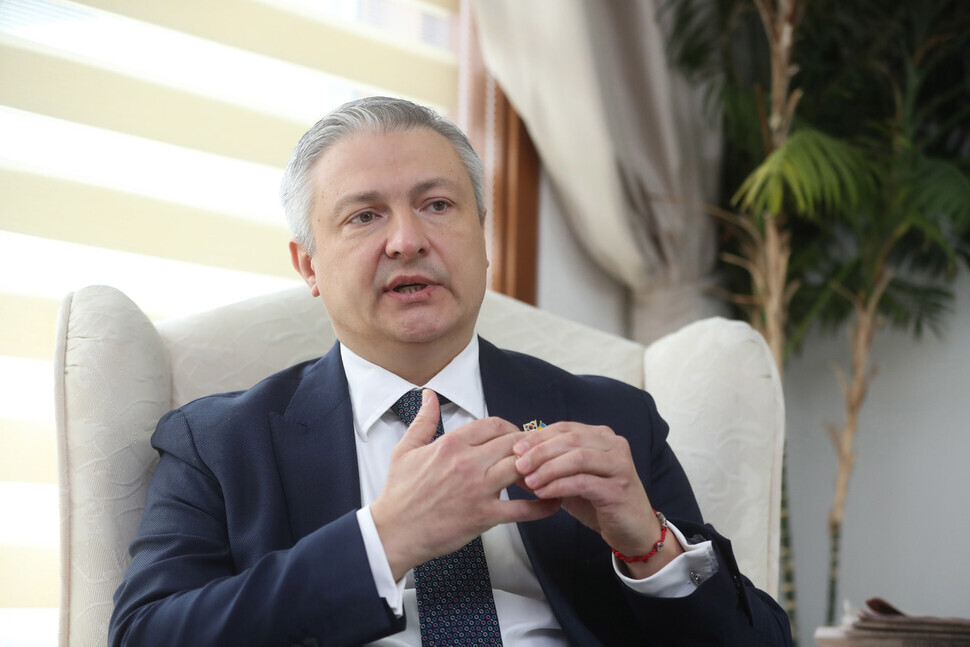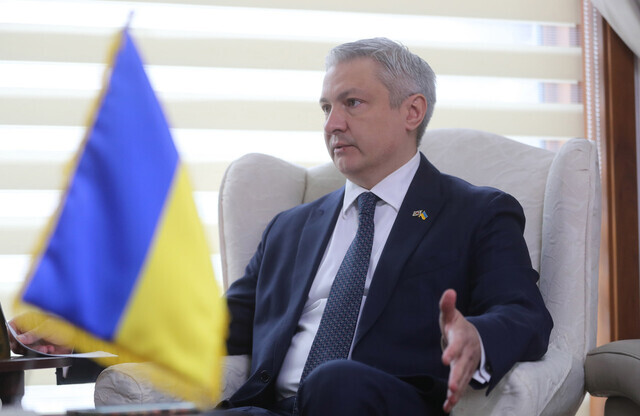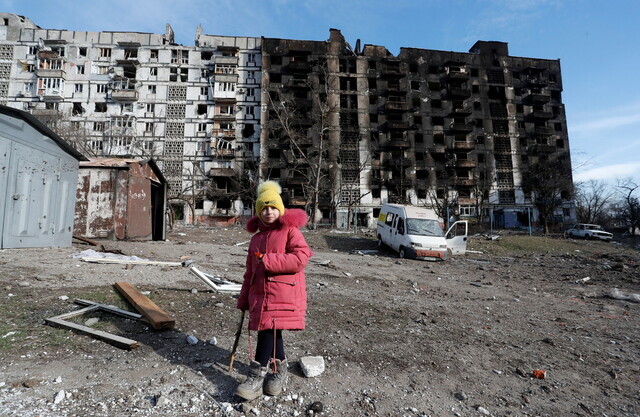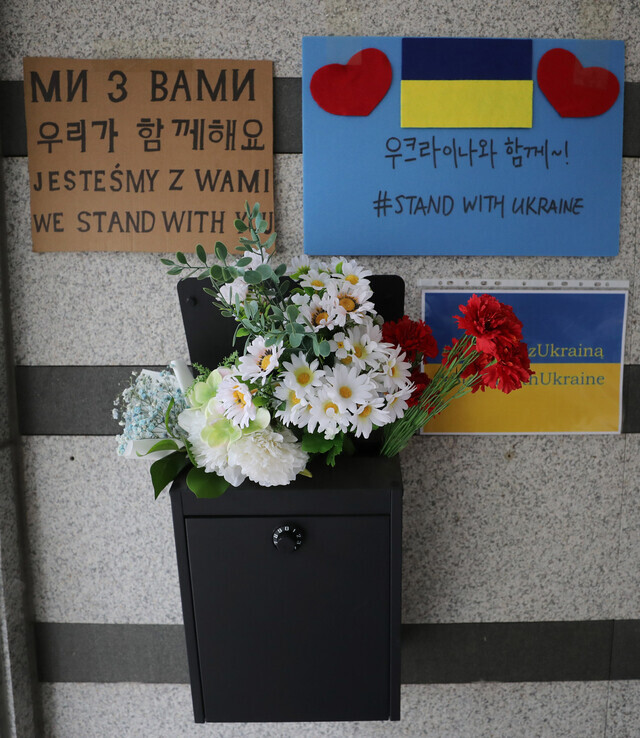hankyoreh
Links to other country sites 다른 나라 사이트 링크
[Interview] Ukrainian ambassador to Korea says victory for Hilteresque Putin would give aggressive regimes “free rein”

At the entrance of the Ukrainian Embassy in Yongsan, Seoul, flowers and handwritten messages from Koreans calling for peace cheer on the Ukrainian people who have stayed resilient in the face of aggression. “Keep your spirits up,” one sign reads. Another says, “Just as barley that has survived winter sprouts better, when hardships pass, a pine tree will shine like a sunflower and stand tall in the sky.”
Ukrainian Ambassador to Korea Dmytro Ponomarenko, who the Hankyoreh met at the Ukrainian Embassy on the afternoon of March 25, said he receives messages of solidarity and support from Korean citizens every day, something for which he said he is sincerely grateful.
Ponomarenko was appointed to his post in Korea on Feb. 16. Only eight days later, news broke that his home country had been invaded. In the time since, he has spent his days meeting with South Korean government officials, politicians, and citizens, and attending events held around Korea calling for an end to the war and support for Ukraine.
The Ukrainian ambassador called Russia’s claims that the war broke out because of Ukraine's attempt to join NATO or purported Nazi ties within the country “ridiculous,” adding that “Putin's behavior is dangerously similar to Hitler.”
Ponomarenko said a victory for Putin would signal to “aggressive regimes” around the world that they can do whatever they want, underscoring the need for the international community to come together to put a stop to the war in Ukraine before it turns even more catastrophic.
The Hankyoreh’s interview with Ponomarenko follows.
Hankyoreh (Hani): Many people are heartbroken by the Russian military’s brutal destruction and its murder of Ukrainian people. Do you think Putin is committing war crimes in Mariupol and other cities in Ukraine?Dmytro Ponomarenko (Ponomarenko): Yes, absolutely. There can be no doubt about it. It is a war crime. The residential areas of many cities in Ukraine — Kharkiv, Chernihiv, Sumy, the outskirts of Kyiv and many others — are intensively shelled, leaving dozens of innocent civilians killed and wounded daily. But the situation in the besieged city of Mariupol is the worst. The city is now almost destroyed. Daily, 50 to 100 aviation bombs are dropped by Russians. Thousands of civilians have lost their lives due to Russia’s attacks and blockade.
Russia’s crimes include the bombardment of a drama theater where up to 1,300 civilians were being sheltered, of an art school, which served as a shelter for around 400 civilians, and the seizure of a hospital with 400 civilians in it used as a human shield. According to the Prosecutor General’s Office of Ukraine, 143 children were killed by Russian invaders, and more than 216 wounded (as of March 28). Faced with logistical challenges, Russian troops began pillaging local residences and robbing humanitarian convoys. The Russian army in Ukraine has been ordered to “switch to self-sufficiency.” To put it more understandably, the Kremlin has officially sanctioned looting.
All of these constitute crimes against humanity. Consensus in the world is growing of the necessity to create a tribunal to bring Putin and his clique to justice for their crimes in Ukraine. In fact, the US Senate has recently declared him a war criminal and the US government will help gather evidence of those crimes for future trial.
I had a meeting with Ban Ki-moon, the former secretary-general of the United Nations, and he supplied me with a statement from The Elders — a group of former high officials and leaders [from around the world]. The Elders called for a special criminal tribunal to investigate the alleged crime of aggression in Ukraine and to hold [Russia] to account for the invasion of Ukraine and Ukraine’s sovereign territory. After the war is over, we will put every effort into ensuring that no crime against the people of Ukraine goes unpunished.
Hani: Negotiations between Russia and Ukraine are underway. Despite the Ukrainian government offering a concession in the form of a vow not to join NATO, the two sides have yet to reach an agreement. What’s the reason for this?Ponomarenko: Ending the war launched by Russia remains Ukraine’s key priority. Faced with military defeats on the ground, the Russian side has now taken a slightly more realistic stance in the talks. Regrettably, it remained unresponsive to Ukrainian proposals of a ceasefire and humanitarian corridors during the meeting of [Ukrainian Foreign] Minister Kuleba with [Russian Foreign Minister] Lavrov in Turkey on March 10. I believe the negotiations will bring about a ceasefire and the end of the war as soon as Russia realizes the futility of its offensive on the ground. The more successful Ukrainian troops are in defeating the Russian army, the more constructive Russia will get.
As for compromise, President Zelenskyy reiterated on March 20 that no ultimatums will be accepted by Ukraine regarding its territorial integrity and sovereignty. If we decide not to join NATO, we will need international legally binding long-term guarantees of security. Such guarantees can be provided in particular by the UNSC [UN Security Council] member states and Ukraine’s neighbors, similar to the mechanism envisaged by the North Atlantic Treaty. They need to be strong enough to prevent any further attempts by Russia to attack Ukraine.
Hani: It's been a month since Russia invaded Ukraine, and the Ukrainian people continue to resist. Will the Ukrainian people continue to fight even if the war becomes prolonged?Ponomarenko: The power of Ukrainians lies in their spirit. We value our freedom, and we are bold and stubborn in this. We will fight with all we can against oppression, occupation, or any attempt to destroy our statehood, our families.
The Russians expected Ukrainians to greet them with flowers. Instead, they were met with an iron resolve. The Russian army loots. They are hungry, abandoned and demoralized. The Russian murderers have no hope of winning in Ukraine. They have no reason or moral explanation to be and fight in our country. Ukrainians will not surrender as we protect our homes and our land. We will continue fighting. To this end, it is crucial to further strengthen Ukraine’s defense capabilities, apply more pressure on Russia, and use all available diplomatic tools.

Ponomarenko: He can only win when he completely destroys our country. If Putin wins in Ukraine, the war will spill over to the other countries of Europe. His victory will signal free rein to other aggressive regimes willing to redesign the world map according to their wishes. What is more dangerous is that the Russian people apparently fully subscribe to such a point of view. According to one case study in March, 86.6% of Russians support the idea of war against EU countries. Their next target after Ukraine would be Poland (75.5% support) or the Baltic states (41%), then others (Bulgaria, Hungary, former Czechoslovakia - 39.6%). That is why we have always reiterated the need to stop Putin’s aggressive regime as soon as possible. We need strong measures of deterrence by the whole international community before the world faces an even bigger catastrophe than it does now.
Hani: Do you think Putin could actually use biochemical weapons and nuclear weapons?Ponomarenko: The danger of Putin’s regime is that it stops at nothing. Russia’s irresponsible actions pose the gravest nuclear and chemical contamination threats. The actions of Russian troops in Ukraine confirm it. On March 4, all of Europe was put on the brink of nuclear disaster when they began shelling the Zaporizhzhya Nuclear Power Plant, the largest in Europe. Fortunately, Ukrainian firefighters managed to put the fire out. The Russian military seized it (400 military personnel and 50 military vehicles are stationed there now) and declared that the plant is now under the control of Rosatom [Russian state-owned nuclear power company], which turned out to be untrue. The Chornobyl Nuclear Power Plant was also seized by the Russian troops. They have already twice damaged its power line, which could lead to a radiation leak. Both times, Ukrainian repair teams managed to restore the power line. The IAEA [International Atomic Energy Agency] has lost connection with the monitoring systems of guarantees both in Chornobyl and Zaporizhzhya. On March 20, the site of PJSC SumyHimProm (a chemical production plant) was shelled, which caused ammonia leakage from a 50-ton tank. Russia’s nuclear-deterrence forces remain on alert. Putin is fond of brandishing his nuclear threats whenever he likes it. The world cannot be blackmailed forever. This must be stopped.
Hani: After the collapse of the Soviet Union, Ukraine gave up 3,000 nuclear weapons of its own accord and denuclearized. When signing the Budapest Memorandum, the United States and Russia, among others, promised to guarantee Ukraine's security. However, that promise was not kept. What do you think of this situation?Ponomarenko: In 1991, when it gained independence, Ukraine possessed the third-largest nuclear arsenal in the world. It had tactical and strategic ballistic missiles as well as heavy bombers capable of carrying nuclear weapons. All of it was destroyed in 1994 when Ukraine gave up its status as a nuclear power, in exchange for which the US, UK, Russia itself and others guaranteed our sovereignty and territorial integrity under the Budapest Memorandum. Regrettably, it speaks to the naivety of the Ukrainian leadership at the time that, due to the character of the document, those guarantees were not legally binding to the parties. Ukraine was a neutral state when Russia attacked Ukraine in 2014, annexing Crimea and occupying Donbas. Ukraine has tried three times to convene consultations under the Budapest Memorandum after 2014. All the attempts failed due to Russia’s refusal to participate. In the meantime, Russia continued its illegal occupation of our territory and lately unleashed an open full-scale war on us. So now I think we have learned our lesson. Ukraine needs effective, iron-clad international mechanisms guaranteeing our security before we even begin any negotiations on possible neutrality.

Ponomarenko: I believe that any nation has an inherent sovereign right to choose its own security arrangements. We do not recognize the right of any country to impose its vision of zones of interest on others under threat of force. Our desire to join NATO is perfectly understandable given the aggression from the neighbor state we were subjected to from 2014 onwards. The government of Ukraine was acting upon the aspiration of the people of Ukraine to ensure the security of the state. It was exactly because of Russian aggression against Ukraine in 2014 that the idea of joining NATO gained overwhelming support among Ukrainians. The reasoning that Ukraine somehow “made” Russia invade it is completely false and is similar to saying that a victim “provoked” a criminal to attack them. What Putin really intends is to destroy the Ukrainian state. Look at the acts of terror and genocide his troops are committing in Ukraine as we speak. All the facade of caring about “Russian-speaking Ukrainians” or “brotherly nations” has dropped away. The Russians are trying to create their own administrations wherever they can in the territories they manage to occupy.
Putin has realized that, politically, he already lost Ukraine for good. The only way to keep Ukraine in the fold was an open military invasion. Because a free, democratic and prosperous Ukraine at his border was an existential threat to his plutocratic totalitarian regime.
Hani: Russia claims the Euromaidan demonstrations and part of the Ukrainian military have ties to Nazis. Putin also claims that the Ukrainian government has Nazi ties.Ponomarenko: The claim is as ridiculous as any argument Russia used as a pretext for its unjustifiable war against Ukraine. The Euromaidan demonstrations were about people protesting against the corrupt and criminal government, against it taking away their choice of democratic development in the European family of nations where they belong. At no point were there claims to the supremacy of one nation over any other. Russia appears to be in a hurry to declare any nation interested in developing its own language, culture and heritage a Nazi.
At the same time, we have witnessed a cult of hatred towards Ukrainians disseminated by Russian TV channels for years, the Goebbels-style propaganda based on blatant lies, the Russian children and youth militarized organizations, young Russians throwing up Nazi salutes, talk of “resolving the Ukrainian issue once and forever” in the Russian press, et cetera. Not to mention Putin’s own actions and policies that dangerously closely resemble those of Hitler himself. So, who is the Nazi here? Definitely not us!
Hani: The United States, the European Union, Japan and South Korea have imposed unprecedented financial and economic sanctions on Russia. Will the sanctions actually hurt Russia and push Putin to stop the war?Ponomarenko: We are grateful for the decisions already taken by our friends and partners, including the financial sanctions against Russian banks, banning strategic exports, blocking the access of Russian warships to the Black Sea, banning Russian aircraft from entering national airspace, banning supply, leasing, insurance and maintenance of aircraft, et cetera. The unprecedented sanctions are of particular importance, isolating the Russian economy and severely undermining its economic and financial capacities to continue aggression. They are already working.
Atrocities, which continue to be committed by Russia in Ukraine, call for sanctions to be further strengthened and expanded. The world has to stop buying Russian commodities, which continue to finance the Kremlin’s war against Ukraine. We need to introduce a full-flagged trade embargo on Russia, including the gas and oil sector; close ports for Russian transport ships; go after Putin’s cronies’ wallets and their family members; stop satellite broadcasting by Russian channels; stop implementation of joint infrastructure projects. The Russian economy cannot compete with the economies of developed nations. The sooner it crumbles, the sooner this war will be over.
Hani: The Ukrainian government has called for the US and the EU to establish no-fly zones and provide more direct military support. But the US and EU are hesitating, arguing that doing so would escalate the conflict. Do you expect the US and the EU to expand their military support?
Ponomarenko: Yes, Ukraine is in desperate need of closing the sky so that the Russians cease their terror campaign of indiscriminate bombing and shelling of Ukrainian civilians. While taking note of their argument of the threat of war expansion into Europe, we are strongly persuading our European and American partners to provide us with means of anti-aircraft defense. I will not comment further, apart from saying that we are starting to see the results of our work. More and more countries finally see the necessity of helping us defend ourselves.
Hani: Putin expects great help from China to overcome sanctions. Do you expect China to put pressure on Russia to stop the war?
Ponomarenko: Ukraine has always respected and adhered to the “One China policy” [since establishing diplomatic ties in 1991]. China has always declared its respect and support for the sovereignty and territorial integrity of Ukraine.
As to their position, we share Beijing’s position on the need to find a political solution to the war against Ukraine ASAP and call on China as a global power to actively play an important role in these efforts. I hope that China understands and anticipates all the possible terrible consequences of this war of Russia in Ukraine and will find a mechanism to influence the aggressor to end this war.

Hani: Korea has taken part in sanctions on Russia and many Koreans support Ukraine. What role and support do you expect South Korea to play for Ukraine?
Ponomarenko: We are truly grateful for the support shown to us by the Korean public and the government of Korea. Every day we receive tokens of solidarity as well as donations. I have had a lot of meetings with Koreans. A week ago, I attended a very nice concert at the Seoul Arts Center in support of peace in Ukraine.
We welcome the decision of those Korean companies who already stopped doing business with Russia. Ukraine is now at a critical juncture where we need to defend the very existence of our state. Therefore, of vital importance for us is aid for the needs of the Ukrainian Armed Forces. We already received the first supplies of non-lethal humanitarian aid from the Ministry of National Defense of Korea which includes a lot of medicine. We hope to receive more additional support. Russia has been trying not only to steal our sovereignty, but our history and cultural heritage as well. We call for support, solidarity, and help to stop Russian cultural propaganda. Boycott Russian cultural and sports activities as well.
We received the information that the Korean government decided to restore a visa-free regime with Russia [on March 24]. It is painful for us to hear this. Since 2006, Korean nationals have been able to visit Ukraine visa-free, whereas Ukrainians still need a visa to enter South Korea. It is a pity that at the time of Russia’s brutal and unjustified war against Ukraine such a decision was adopted by the Korean government. We hope they will reconsider it.
Hani: What are your thoughts on Koreans who have joined the volunteer army? Are volunteer forces from countries all over the world playing a useful role on the battlefield?
Ponomarenko: I cannot comment on that. Our embassy is well aware that such activities are illegal in Korea. Therefore, we certainly do not encourage Korean citizens to go to Ukraine to fight, nor will we accept such requests. I have no information on the concrete role the volunteer forces from other countries are playing on the battlefield. As a rule, such information is rarely made public in a time of war. All I know is that there are people from 52 countries fighting the invaders alongside the Ukrainian forces. We are grateful to them for that.
Hani: Many Russian citizens are participating in anti-war demonstrations or expressing anti-war opinions despite the threat of oppression. Could this be a factor that will change the situation in Russia?
Ponomarenko: I regret to say that we in Ukraine do not feel that much support from the Russian public. It is true that some Russians voiced their opinion against the invasion of Ukraine. Yes, there were some demonstrations in Russian cities that were quickly suppressed. Their numbers were not at the level that would tip the scale in favor of peace. According to recent surveys, 71% of Russians support this war and the mass killing of Ukrainians. The war in Ukraine is definitely not a one-man show. It is Russian soldiers who murder Ukrainian citizens, Russian journalists that disseminate the poisonous propaganda, Russian officials that share in the regime’s lies and hypocrisies, Russian businesses that help finance the war.
Hani: What is the possibility that President Zelenskyy will address the Korean National Assembly?
Ponomarenko: I can only say at this point that we are considering such a possibility and are working on it. President Zelenskyy would like to explain the truth to the parliamentarians of many countries. To explain what is going on in the field, because he is in Ukraine, he did not leave Ukraine. He would like to explain what is going on in our country, because we know that the Russian propaganda machine is very strong, and they are trying to spread false and distorted information.
We do not expect Russia to win, but if they are successful, the aggression will not stop in Ukraine. It will spread all over Europe and further to other regions. We have already seen the intensification of ballistic missiles testing by your northern neighbor. We are aware that the North Korean regime is dependent on Russia. I think that Russia didn’t expect the Republic of Korea to join the international sanctions, and this strong position of Korea hurt them. So that is probably how Russia can threaten you, through North Korea.
Hani: I’ve heard that President Zelenskyy has paid attention to the similarity in the historical experiences of Korea and Ukraine.
Ponomarenko:70 years ago you had a similar situation when forces supported by the Soviet Union at that time invaded, forcing the Korean government to move to Busan. Then, almost 90% of Korean territory was occupied. Only because of the strong will of the Korean people, as well as the strong support from the international community, could you defend your territory and freedom. That's why we Ukrainians understand that with the help of the international community we are strong enough to win. We have to receive as much support as possible from the countries which share democratic principles and values, so we understand that Korea, in this situation, is on our side. Koreans are well aware of what it means to defend your own land.
By Park Min-hee, editorial writer
Please direct questions or comments to [english@hani.co.kr]

Editorial・opinion
![[Column] The state is back — but is it in business? [Column] The state is back — but is it in business?](https://flexible.img.hani.co.kr/flexible/normal/500/300/imgdb/original/2024/0506/8217149564092725.jpg) [Column] The state is back — but is it in business?
[Column] The state is back — but is it in business?![[Column] Life on our Trisolaris [Column] Life on our Trisolaris](https://flexible.img.hani.co.kr/flexible/normal/500/300/imgdb/original/2024/0505/4817148682278544.jpg) [Column] Life on our Trisolaris
[Column] Life on our Trisolaris- [Editorial] Penalties for airing allegations against Korea’s first lady endanger free press
- [Editorial] Yoon must halt procurement of SM-3 interceptor missiles
- [Guest essay] Maybe Korea’s rapid population decline is an opportunity, not a crisis
- [Column] Can Yoon steer diplomacy with Russia, China back on track?
- [Column] Season 2 of special prosecutor probe may be coming to Korea soon
- [Column] Park Geun-hye déjà vu in Yoon Suk-yeol
- [Editorial] New weight of N. Korea’s nuclear threats makes dialogue all the more urgent
- [Guest essay] The real reason Korea’s new right wants to dub Rhee a founding father
Most viewed articles
- 1Amid US-China clash, Korea must remember its failures in the 19th century, advises scholar
- 2[Column] The state is back — but is it in business?
- 360% of young Koreans see no need to have kids after marriage
- 4New sex-ed guidelines forbid teaching about homosexuality
- 5[Column] Life on our Trisolaris
- 6Presidential office warns of veto in response to opposition passing special counsel probe act
- 7Trump’s talk of flouting NATO promises sparks apprehension in Seoul
- 8[Reporter’s notebook] In Min’s world, she’s the artist — and NewJeans is her art
- 9[Guest essay] Maybe Korea’s rapid population decline is an opportunity, not a crisis
- 10Trump asks why US would defend Korea, hints at hiking Seoul’s defense cost burden